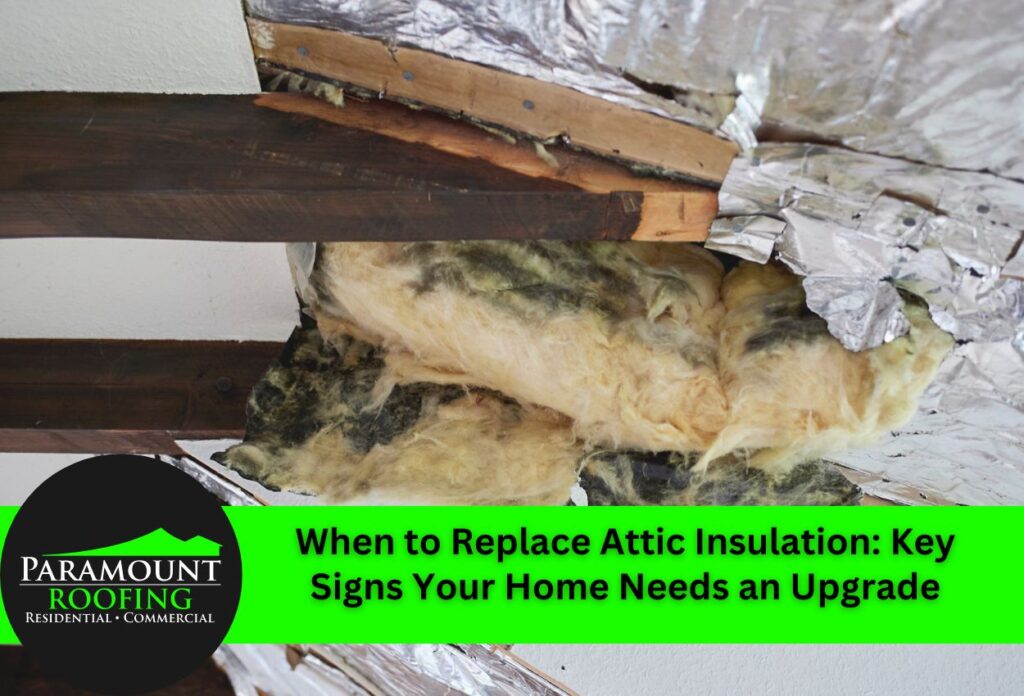When to Replace Attic Insulation: Key Signs Your Home Needs an Upgrade

Proper attic insulation stands out as one of the most important components for maintaining energy efficiency in Detroit homes. As Michigan residents experience both frigid winters and sweltering summers, the condition of attic insulation directly impacts household comfort and utility bills. Most homeowners don’t regularly inspect their attic spaces, leaving deteriorating insulation undetected for years and sometimes decades.
Understanding when to replace attic insulation can prevent significant energy loss and protect against expensive structural damage. While quality insulation materials can last between 15 and 30 years (depending on the type), various factors can accelerate deterioration, including moisture exposure, pest infestations, and extreme temperature fluctuations common to the Detroit area.
Recognizing the signs of aging insulation allows homeowners to take quick action. Unexplained increases in heating and cooling costs or uneven temperatures throughout your home are potential warning signs often indicating that your insulation is no longer performing effectively. Updating attic insulation not only improves energy efficiency and enhances indoor air quality, but it also reduces the strain on your HVAC systems, potentially leading to lower energy bills.
Identifying the Lifespan of Your Attic Insulation
Different insulation materials found in Detroit homes have varying lifespans. Fiberglass insulation, the most common type in Michigan attics, can last up to 60 years or more when properly installed and maintained. Cellulose insulation, made from recycled paper products, generally performs well for about 20 to 30 years before efficiency begins to decline. Spray foam insulation offers the longest lifespan, sometimes exceeding 80 years, with minimal degradation in our Michigan climate.
Detroit’s environmental conditions impact how long attic insulation lasts. Our humid summers can introduce moisture that compromises fiberglass and cellulose materials, while our extreme temperature fluctuations, from below-zero winters to summers that hit up to 90 degrees Fahrenheit, cause expansion and contraction that wears down insulation over time.
Michigan’s freeze-thaw cycles create ideal conditions for ice dam formation, which can force moisture into attic spaces and damage insulation. Older Detroit homes with inadequate ventilation systems face even faster insulation breakdown due to trapped moisture and heat. Understanding how long insulation typically lasts helps homeowners anticipate replacement needs before efficiency significantly drops, preventing the symptoms of damaged insulation that lead to higher energy bills.
Warning Signs That Your Attic Insulation Needs Replacement
Recognizing when attic insulation has deteriorated is important for maintaining energy efficiency. During attic inspections, look for visual indicators like compacted insulation that’s flattened from its original thickness. Proper insulation should maintain a consistent loft. When it’s compressed, its R-value (a measure of how well a material resists heat flow) decreases significantly. Check for inconsistent coverage across your attic floor. Gaps, thin areas, or completely bare spots allow heat to escape in winter and enter during summer.
Discoloration often signals problems, with dark spots or staining typically indicating water damage or mold growth. Moisture damage is a serious concern as well. Insulation that feels damp or shows signs of water staining needs immediate attention, as wet insulation loses effectiveness and creates conditions for mold growth.
Beyond the attic, signs of failing insulation appear throughout your home. Dramatic temperature differences between floors often indicate poor attic insulation, with second floors becoming uncomfortably hot in summer or cold in winter. If your HVAC system is constantly running but struggles to keep temperatures comfortable, your insulation may no longer be performing effectively. Detroit homeowners may also notice higher than normal energy bills despite similar usage patterns, a common symptom of insulation that’s reached the end of its functional lifespan and needs replacement.
How Damaged Insulation Affects Your Home and Health
Deteriorated attic insulation creates a bunch of problems for Michigan homeowners that extend well beyond simple energy inefficiency. In our harsh winter climate, damaged insulation often leads to troublesome ice dams forming along the roof edges. These ice formations occur when heat escaping through poorly installed or damaged insulation melts snow on the roof, which then refreezes at the colder eaves. Over time, ice dams can force water under shingles, damaging roof decking, interior ceilings, and wall cavities in Detroit-area homes.
Excessive moisture buildup represents another serious consequence of failing insulation. As warm, humid air passes through insulation gaps, it condenses in cooler attic spaces, creating perfect conditions for wood rot and structural deterioration. Left unchecked, this moisture can compromise roof trusses, joists, and other critical structural components.
The health implications of aging insulation are equally concerning. Deteriorated materials often carry allergens, dust, and other particulates that circulate through your home’s air supply. Many older insulation products become breeding grounds for mold spores when exposed to moisture, potentially triggering respiratory issues, allergic reactions, and other health problems for family members. Rodent or insect infestations in damaged insulation further degrade indoor air quality by introducing droppings, dander, and other contaminants. Replacing compromised attic insulation not only improves your home’s energy performance but also creates a healthier indoor environment for everyone under your roof.
Energy Efficiency Improvements from Insulation Replacement
Replacing outdated attic insulation delivers substantial energy-efficiency improvements for Detroit homeowners. With Michigan’s seasonal temperature variations, properly installed insulation creates an effective thermal barrier that significantly reduces heat transfer all year. During harsh winters, new insulation prevents valuable heat from escaping through the attic, keeping living spaces warmer while reducing the workload on heating systems. In humid summer months, the same insulation blocks heat from hot attic spaces, maintaining cooler indoor temperatures without overworking air conditioning units.
The long-term return on investment for attic insulation replacement proves compelling for Michigan homeowners. While upfront costs vary based on home size and insulation type, most Detroit residents see energy savings between 15% and 25% after upgrading to properly rated attic insulation. These monthly utility reductions typically recover the initial investment within 3 to 5 years, after which the savings continue throughout the insulation’s lifespan. Beyond direct energy savings, new insulation extends HVAC equipment life by reducing operational demands, potentially saving thousands in premature system replacement costs.
Additionally, upgraded attic insulation improves overall home comfort by eliminating cold spots, reducing drafts, and maintaining consistent temperatures between floors. For homeowners planning long-term residency in their Detroit properties, few home improvements deliver more consistent financial returns than quality attic insulation replacement.
Professional Assessment vs. DIY Evaluation
When deciding whether your attic insulation needs replacement, you have two evaluation options: examining the space yourself or hiring a professional. For Detroit homeowners comfortable accessing their attic, a preliminary self-inspection can identify obvious issues. Always prioritize safety by using a sturdy ladder (if necessary), wearing protective gear (mask or respirator, gloves, and goggles), and stepping only on joists to avoid ceiling damage. During your inspection, document visible problems with photos, focusing on wet spots, compressed areas, visible gaps, and any signs of pest activity. Check insulation depth with a ruler and note any unusual odors that might indicate mold or mildew.
While DIY evaluations provide initial insights, professional assessments offer significant advantages. Qualified Detroit-area contractors bring specialized tools like thermal imaging cameras that detect heat loss invisible to the naked eye. These infrared scans reveal hidden issues such as air and water leaks and insulation voids that homeowners typically miss. Professionals can accurately measure R-values across different areas, identify proper ventilation requirements specific to Michigan’s climate conditions, and detect subtle signs of damaged insulation that untrained eyes overlook.
Professional assessors also provide valuable guidance on the most effective insulation solutions for your specific home structure and local climate demands. They can identify problems that extend beyond the insulation itself, such as roof leaks, ventilation deficiencies, or electrical hazards that require attention before insulation replacement begins. For an evaluation of your attic insulation condition, a professional assessment delivers the most reliable results.
Preparing for Your Attic Insulation Replacement Project
Planning is important for a successful attic insulation replacement in your Michigan home. The best time to schedule this project is typically late spring or early fall, when temperatures are moderate. This timing helps avoid the extreme cold of Detroit winters or the intense heat of summer, creating safer working conditions and allowing new insulation to settle properly before facing seasonal extremes.
Before work begins, clear access to your attic by removing stored items and ensuring a clear path to the attic entrance. Protect belongings in rooms below the workspace with drop cloths to catch any debris. If you have recessed lighting fixtures or bathroom fans that extend into the attic, they should be properly sealed to prevent moisture buildup, a common problem in Michigan’s climate.
For Detroit-area homes, several insulation options offer excellent performance. Fiberglass batts or blown-in fiberglass provide good value and perform well in our climate when installed correctly. Cellulose offers superior sound-dampening qualities and settles tightly around obstructions. Spray foam provides the highest R-value per inch and creates an airtight seal, making it effective for Michigan’s harsh winters.
Ensure Your Comfort with Paramount Roofing’s Expert Insulation Services
If you’re noticing any of the key warning signs of your insulation beginning to fail, such as uneven temperatures in your home, increased energy bills, or visible damage to your attic insulation, it may be time to consider a replacement. With Michigan’s harsh winters and hot summers, maintaining effective attic insulation is crucial for your comfort and health. Don’t let outdated or damaged insulation compromise your home’s energy efficiency and air quality.
Paramount Roofing offers professional attic insulation assessments and replacement services tailored to Detroit’s unique climate. Our experts use the latest technology and materials to ensure your home stays comfortable year-round while helping you save on energy costs. Protect your home and improve your living environment by calling us today at (586) 690-0227 for a comprehensive insulation evaluation and expert advice on the best solutions for your needs.
 Free Estimate
Free Estimate
 Request Service
Request Service Locations
Locations 



